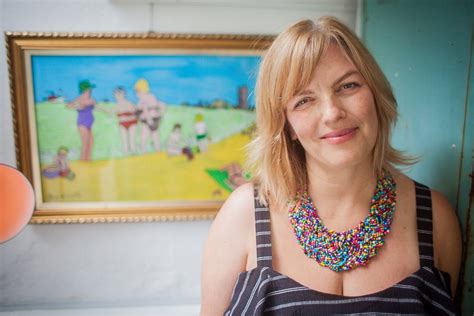A Quote by William Zinsser
One of underestimated tasks in nonfiction writing is to impose narrative shape on an unwieldy mass of material.
Quote Topics
Related Quotes
When you're researching things that have happened, the clear narrative arc is not there already. This is the problem of writing nonfiction for me - writing nonfiction which is about serious subjects and has serious political and social points to make, yet which is meant to be popular to a degree - what happens when the facts don't fit a convenient narrative arc? I guess that for a lot of nonfiction writers that is a central challenge.
Fiction stymies me with its possibility. I can't see the bottom and I freeze, cling to the side, or just choke. In nonfiction, particularly that which takes personal narrative for its primary topic, I have a finite space and a finite amount of material. I can't fabricate material, I can only shape and burrow into it.
Lists help us manage the chaos of our lives—to impose order, if only for a moment. Writing a list clears the mind. … Once everything is written down, it’s easier to see which tasks are important and in what order to tackle them. Tasks that seem overwhelming look easier when reduced to mere lines on paper.
What I felt was, if you spend your life just writing fiction, you are going to falsify your material. And the fictional form was going to force you to do things with the material, to dramatize it in a certain way. I thought nonfiction gave one a chance to explore the world, the other world, the world that one didn't know fully.
The thing I always tell my writing students - I'm not a full-time instructor, by any means, but periodically I've taught writing students - what I always tell them is that the most important thing in narrative nonfiction is that you not only have to have all the research; you have to have about 100% more than you need.
As I started to read nonfiction in the mid '70s, I discovered, holy cow, there was a lot of imaginative nonfiction. Not the kind where people use composite characters and invented quotes. I hate that kind of nonfiction. But imaginative in the sense that good writing and unexpected structure and vivid reporting could be combined with presenting facts.
The biggest challenge in the research process is to let go, to stop, to say enough, and then to reduce all of that beloved labor down to a few succinct paragraphs that shape the background to your narrative. I love research - that's all the fun, especially in the field. To write, however, is to suffer, and my pieces usually come in thousands of words over the assigned length. That's a serious flaw in my writing process - shaping and disciplining the footlockers of material one has so happily gathered.
I guess the wildcard here is Terrence Malick. He supervised me while I was writing the script for Beautiful Country, and he is a genius, although not always easy to follow. What I learned from him is that the narrative can be tracked through all kinds of scenes, that the strong narrative thread is not always the one that is most obvious. Creating narrative with Malick was a bit like chasing a butterfly through a jungle. This approach to narrative is fun and complicated, something that makes the process of writing constantly interesting to this writer.






































